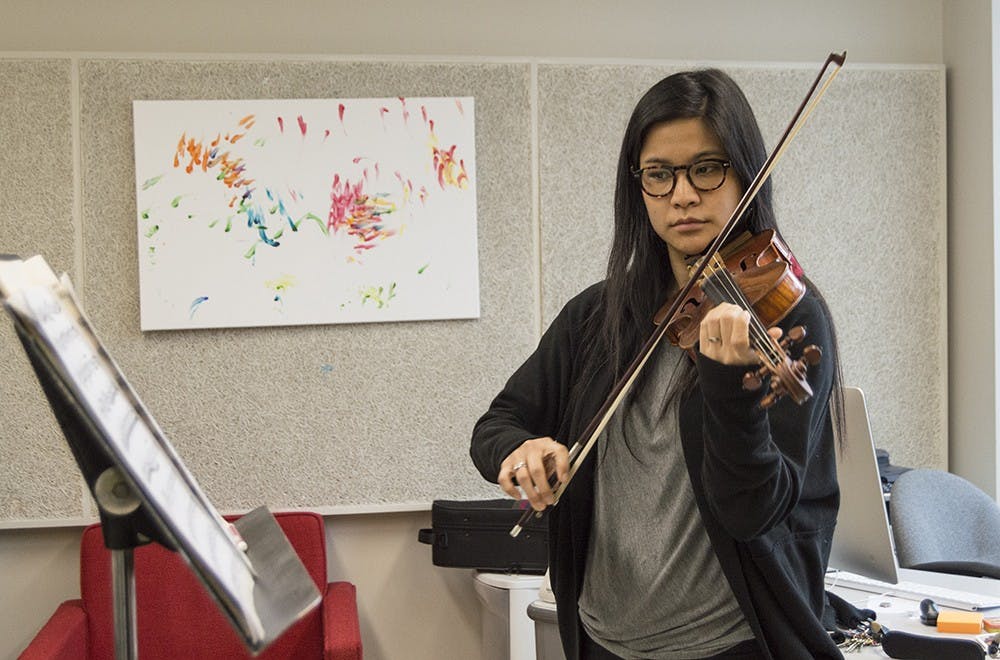Music students of all ages know that music is not just memorizing notes from Vivaldi and practicing the proper technique. It becomes an outlet of creative expression, a way to convey thoughts and feelings to the audiences.
That is what UB music professor Numata Resnick is teaching her students in the Buffalo String Works after school program. Buffalo String Works is a non-profit organization for refugee and immigrant children in Buffalo. Inspired by the music students at Buffalo Public School No. 45, the idea was to provide intimate private lessons for underprivileged students.
“By giving our Buffalo String Works students an opportunity to congregate outside of the classroom, outside of school, outside of these walls that imply academia and discipline,” Resnick said, “I feel like I’ve seen tremendous growth in their social skills, in the way they interact with each other and the way they interact with us.”
Resnick, with the help of local violist Virginia Barren and school No. 45 music teacher Elice Golove, started the program a year and a half ago.
Today she has the help of many people from the community and local volunteer high school students.
She’s created an internship program working with Buffalo String Works so that her UB students can get the chance to teach music.
Today, the program is thriving and caters to 38 students from both public school No. 45 and the West Buffalo Charter School. For Resnick, each group lesson is much more than just a musical after-school program that meets twice a week.
“We’ve had so much support from private donors that now we are looking into grant writing and corporate sponsorship and trying to grow ourselves on that side of things as well,” Resnick said.
For Resnick, music also plays a serious role in helping her students express themselves in a manner that may be less complicated. With the time spent practicing after school, she said the children are allowed to grow and mature in a setting outside of the classroom.
“Many of our students are from all over the world,” Resnick said. “[For] some, English is not their first language. Music provides them a way of expressing themselves in a universal language that has nothing to do with words.”
The opportunity to play and practice an instrument is seen as an experience that every student should have. It’s the chance to experience and create something new.
For young students coming from different countries, music becomes more than just a hobby – it becomes a way for them to ease the stress of living and experiencing an entirely new environment and culture.
“Kids from other countries might feel away from home here in the United States. However, music gives them a voice to connect with others, it makes them feel not like an outsider, but like they are part of a community,” said Jaspreet Kaur, a sophomore nursing major interested in social work.
Jared Armitage, a junior political science major, said projects like the Buffalo String Works provide a great outlet for kids. The program is not only providing them with tools and instruction, but also a chance to grow in a way that may not have been possible in their home countries, he said.
“Music is a good way to express yourself. I think it’s a good outlet for the kids to have to deal with their transition from their home country to here. I also think it’s a great avenue to make friends and expand their horizons,” Armitage said.
As of now, Buffalo String Works provide free violin lessons on Mondays and Wednesdays in the afternoon at the Concerned Ecumenical Ministry from 2:30 to 3:30 p.m. and 3:45 to 5:15 p.m.
The program plans to introduce cello lessons this fall and then the viola soon afterward.
In the future, Resnick hopes to expand the program even further, creating a fully equipped orchestra and even branching out into a community music school.
Gabriela Diaz is a contributing writer and can be reached at arts@ubspectrum.com.





